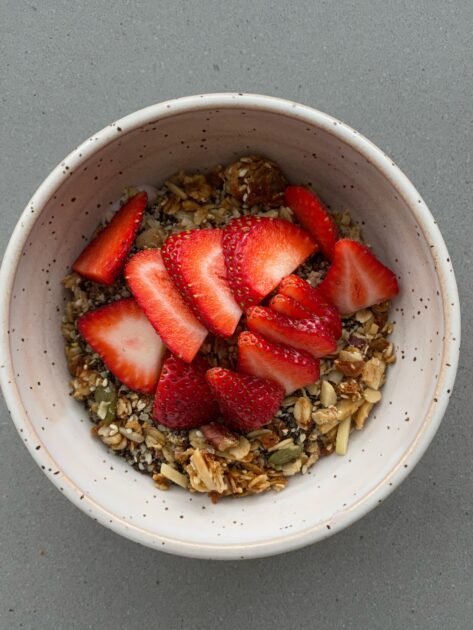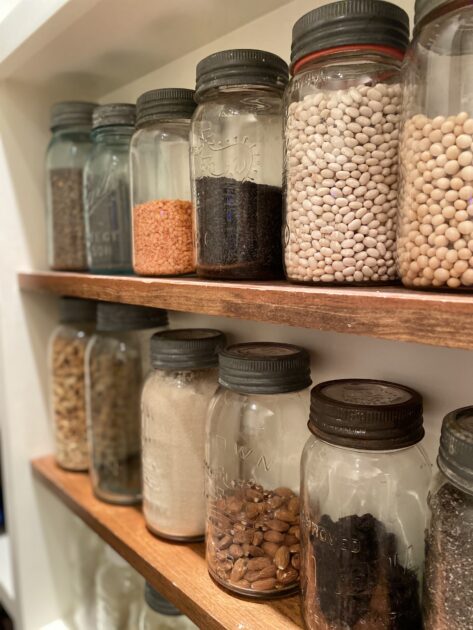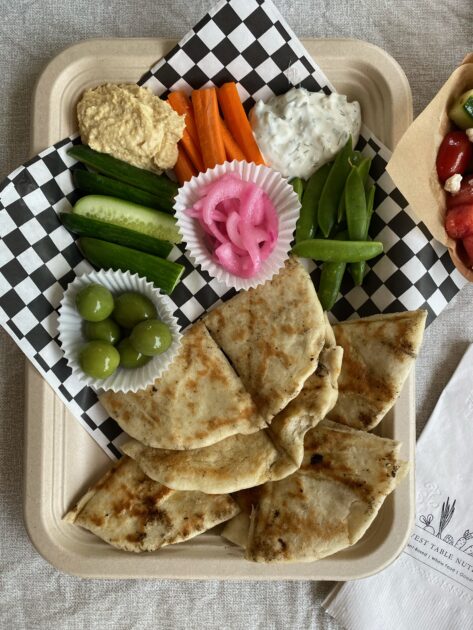By Bailey Franklyn, Harvest Table Nutrition
Fueling your child and focusing on their nutrition can be key to optimizing their performance. Athlete nutrition doesn’t have to be complicated, or include supplements and sports drinks. There are a few key nutrients to be mindful of, and most young athletes can meet their needs through a balanced diet, with lots of variety.
Carbohydrates
Regardless of age and activity level, carbohydrates are the body’s preferred source of energy. They are a quick fuel source for our brain and muscles, and they are the most important fuel source for athletes. Think of carbohydrates like the gas in a tank. If we don’t regularly fuel up, we’re running on empty, and for young athletes, that can really impact performance.
Every child’s needs are different, but on average carbohydrates should make up about 45-65% of their total daily calories (up to about 18 years old). So be sure to include a source of carbohydrates with every meal and snack.
Some good sources of carbohydrates are whole grain breads & pastas, potatoes, rice, oatmeal, fruit and dairy or dairy alternatives.
Some easy ways to add carbohydrates to meals and snacks:
- Serve crackers with cheese or dip
- Choose whole grain bread and pasta
- Include a granola bar with lunch



Protein
Protein is an essential macronutrient for building and maintaining muscle, but also healthy skin, hair and nails. For short duration activity, protein is not the primary source of fuel (that would be carbs). However, when your child is skiing all day, protein will be important for maintaining their energy levels.
Most kids and teens can meet their protein needs from food alone, and do not require a protein supplement. Offer a variety of protein sources, and include one at each meal and snack.
Some easy ways to add protein to meals and snacks:
- Offer yogurt or hummus as a dip with vegetables, fruit or crackers
- Add hemp hearts or pumpkin seeds to yogurt, toast, cereal or add into baked goods
- Try pasta made with lentils, beans or chickpeas
Fluids
Adequate hydration is sometimes overlooked, but is important for athletes to replace fluids they lose through sweat, and to maintain a proper body temperature.
We think of skiing as being a cold sport. It’s winter, it’s snowy, and kids need to bundle up to keep warm. But they’re moving most of the day, and even though it’s cold outside, they’re losing fluids. And if they’re running gates, dryland training or hiking the hill, they’re going to sweat even more. So it’s important to keep them hydrated to maintain optimal performance, both physically and mentally.
Water is the best option to keep your kid hydrated. Sports drinks aren’t needed and often aren’t recommended, unless the activity is longer than an hour and is very intense. Fluid needs are unique to each child, and depend on a variety of factors.
Feeling thirsty isn’t the first sign of needing to drink more. It’s actually one of the last. So don’t wait for your kid to mention they’re thirsty before encouraging them to drink. Ensure they have something to drink at meals, and remind them to have some water when they’re in the lodge for a break.
Vitamins & Minerals
All kids need a well balanced diet with lots of variety to ensure they’re getting all the nutrients they need. However, there are two nutrients in particular to focus on when feeding your young athlete: calcium and iron.
Calcium is a crucial mineral for bone health and preventing stress fractures. Dairy is a good source of calcium (yogurt, milk, cheese), but it’s not the only source. Broccoli, dark leafy greens like spinach or kale, as well as fortified plant milks are also good sources of calcium.
Iron is a key mineral in how oxygen is delivered to the muscles, brain and other tissues. As kids grow, they require more iron to support increased blood volume and muscle growth. We commonly think of meat, fish and eggs as good sources of iron, and they are. But there are also plant-based sources, if you or your child are plant-based. Tofu, fortified cereals, lentils, chickpeas and pumpkin seeds are also good sources of iron.

About Bailey Franklyn
Bailey Franklyn, Culinary Registered Dietitian, created Harvest Table Nutrition, a business that teaches people how to cook healthy meals while also teaching them about health and nutrition.
Bailey has been vegetarian for almost 15 years, so she know the struggles AND the rewards that come with that lifestyle. She is on a mission to help people experience the best and most delicious side of plant-based eating, where ever you are in your journey – whether you’ve been plant-based for years, or if you’ve just started.
Want to work with Bailey?
If you’re looking to take your nutrition to the next level and capitalize on fueling your epic winter seasons, here are a few ways you can work with Bailey:

